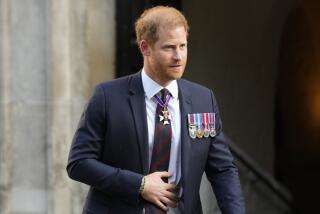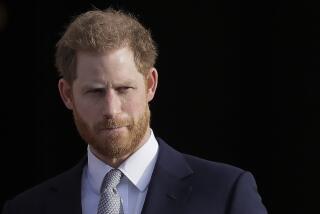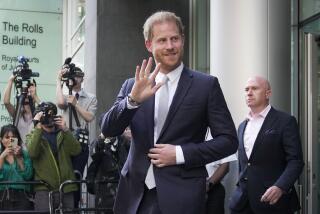J.K. Rowling testifies about media abuses in Britain
The paparazzi outside her door. The callers posing as someone else to glean information. The reporter who slipped a note into her daughter’s backpack.
It was a relentless pursuit by the press that she couldn’t just make vanish, and on Thursday, the creator of boy wizard Harry Potter described the impact it had on her and her family.
“It feels threatening to have people watching you,” J.K. Rowling said, adding: “The cumulative effect … becomes quite draining.”
She even tried chasing down a photographer who had lain in wait in front of her home when she emerged with her newborn, until her older daughter told her to “calm down.”
“I felt completely trapped in the house, and of course that had a massive effect on the children,” Rowling said.
The celebrity author recounted her experiences with Britain’s aggressive media before a judge-led inquiry into press standards here in a London courtroom. The inquiry, launched in the wake of the phone-hacking scandal that exposed illegal practices by a bestselling tabloid in search of sensational copy, could lead to greater regulation of Britain’s fiercely competitive media industry.
Rowling, 46, was the last witness to testify this week in a lineup heavy on star power. Earlier, actors Hugh Grant and Sienna Miller also told of their run-ins with insatiable and often threatening journalists, while parents of missing and murdered children described how they were hounded, bullied, smeared and even blackmailed by seemingly remorseless tabloids.
Rowling, the world’s best-known children’s author, said that she was unprepared for the ceaseless media attention brought on by the success of her Harry Potter series and that she was intent on preserving the privacy of her three children.
But that sometimes proved impossible when photographers with telephoto lenses lurked unseen and journalists found ways around her defenses. In one particularly galling incident, she said, she discovered a note from a reporter stuffed into her daughter’s knapsack.
“I felt such a sense of invasion,” Rowling told the inquiry. “It’s very difficult to say … how angry I felt that my 5-year-old daughter’s school was no longer a place of, you know, complete security from journalists.”
At other times, photos were published of her in a bathing suit on what she thought was a private beach in Africa, a pair of journalists camped out in a car in front of her house for days and her home address in Scotland appeared on the Internet.
Eventually, feeling as if she were “under siege or like a hostage,” she felt she had no choice but to move.
“I can’t put an invisibility cloaking device over myself and my house,” she said, recalling the “invisibility cloak” that Harry Potter often wears. “Nor do I wish to.”
Like other witnesses at the inquiry, Rowling emphasized that she believed in a free press but urged better regulation to prevent abuses.
“We have at the one end of the spectrum people who literally risk their lives to go and expose the truth about war and famine and revolution, and then at the other end we have behavior that is illegal and I think unjustifiably intrusive,” she said.
Miller, the actress, said earlier Thursday that the tactics of the paparazzi included chasing her down streets late at night, speeding alongside her car on motorcycles to snap her photo and even spitting at her to provoke a reaction they could capture on film.
“Every area of my life was under constant surveillance,” said Miller, the onetime girlfriend of actor Jude Law. “I felt very violated and very paranoid.”
Then she discovered that her paranoia was well-founded. As it turns out, reporters from the News of the World tabloid were hacking into her cellphone, listening to private voicemail messages and publishing scoops that she had accused her family and friends of selling to the tabloid.
Miller sued the News of the World and won a settlement worth about $160,000 in May. Phone hacking by the newsweekly is now thought to have been carried out on an almost industrial scale. Public outrage forced media baron Rupert Murdoch to shut down the tabloid in July.
“I was very nervous of taking on an empire that was richer and far more powerful than I will ever be,” Miller said. “Then I saw the evidence that I obtained from the police, and felt I couldn’t not do something about it.”
The inquiry is expected to last for months. Media analysts say the judge, Brian Leveson, could recommend stricter regulation of the press, though the tricky question is what form it might take and how it can stop short of outright censorship.
“I can’t pretend I have a magical answer,” Rowling said in her testimony Thursday, then added: “No Harry Potter joke intended. That slipped out.”
More to Read
Sign up for Essential California
The most important California stories and recommendations in your inbox every morning.
You may occasionally receive promotional content from the Los Angeles Times.











